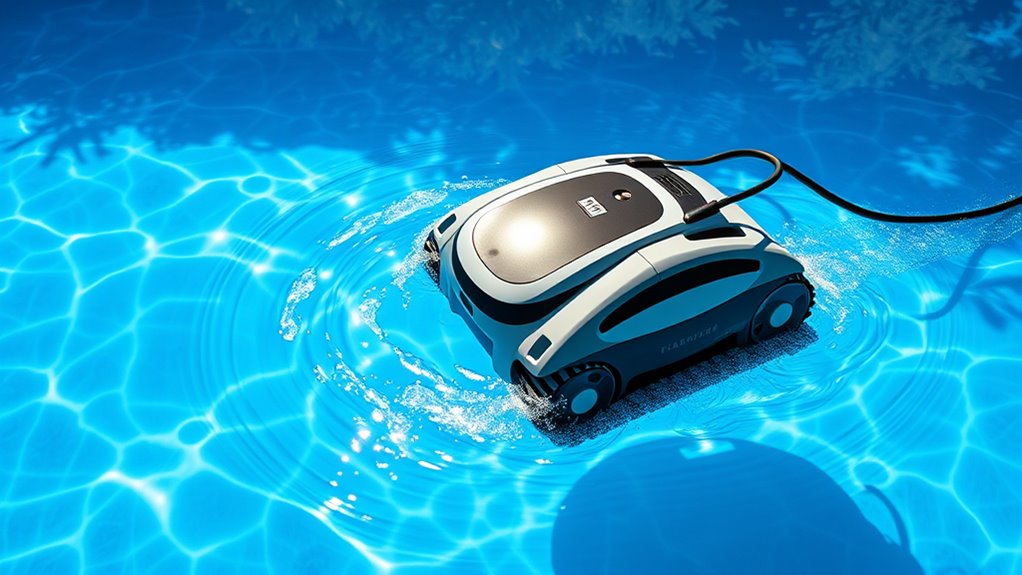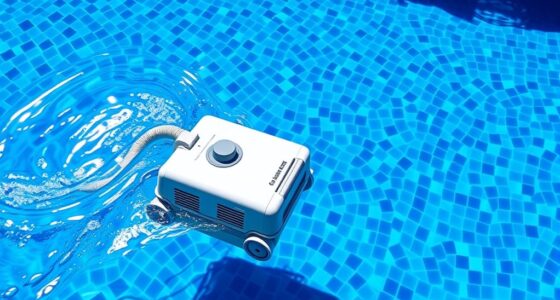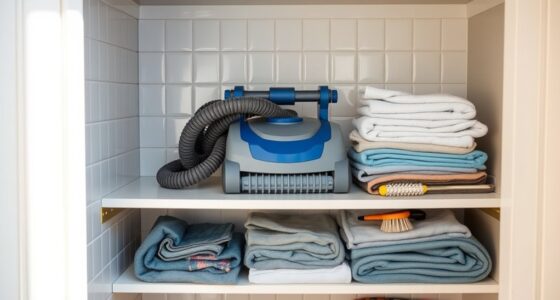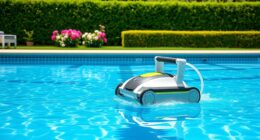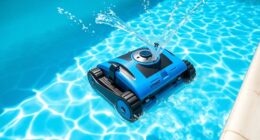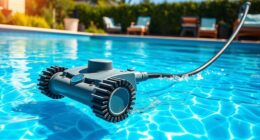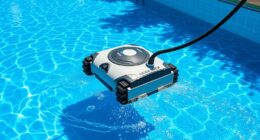How often you should run your suction pool cleaner depends on your pool’s usage, weather, and surrounding environment. Typically, if you swim frequently or have lots of debris, you’ll need to run it 3-4 times a week, especially during warm months. For less busy pools, once a week may suffice. Monitoring water clarity and filter performance helps determine if you need to adjust the schedule—more tips are just a step away.
Key Takeaways
- Run the suction pool cleaner regularly, typically 1-3 times per week, based on debris levels and pool usage.
- Increase cleaning frequency during heavy use, windy weather, or when debris accumulation is high.
- Adjust cleaning schedule seasonally; more frequent cleaning in warmer months to manage algae and debris.
- Check and clean filters and skimmer baskets often to ensure suction efficiency and reduce clogging.
- Divide cleaning sessions into shorter, consistent intervals for thorough debris removal and equipment longevity.
Factors Influencing Cleaning Frequency
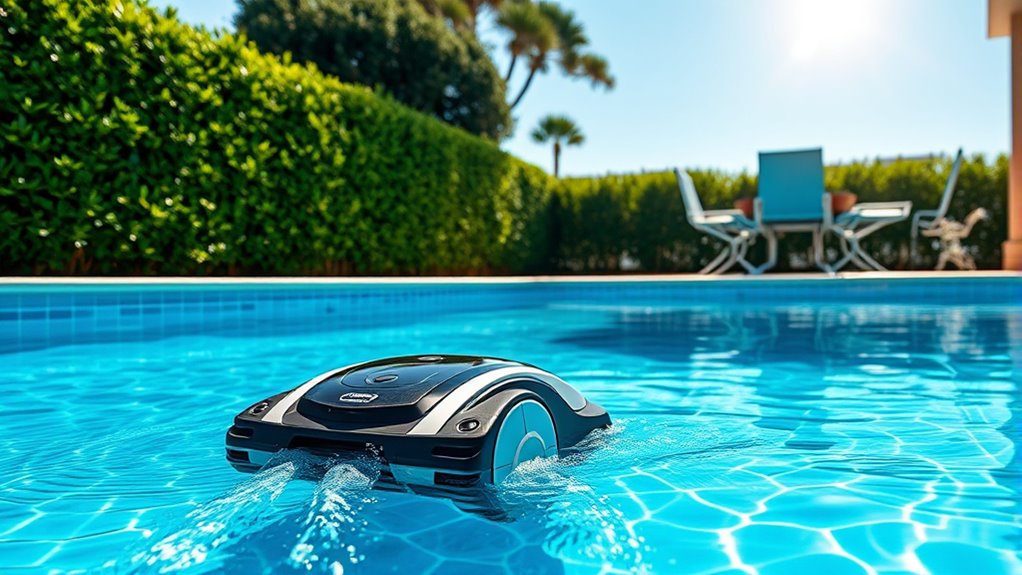
Several factors directly influence how often you should run your pool cleaner. One key aspect is your pool’s chemistry, as balanced pH and chlorine levels reduce debris buildup and algae growth, minimizing cleaning needs. When your pool’s chemistry is off, dirt and algae can accumulate faster, requiring more frequent cleaning. Maintaining proper chemical balance also helps in preventing algae growth, which can otherwise make your pool require more intensive cleaning. Weather impact also plays a significant role; windy days blow leaves and debris into your pool, increasing the cleaning frequency. Heavy rain can introduce dirt and contaminants, while hot, sunny weather promotes algae growth, demanding more maintenance. Additionally, your pool’s location and surrounding environment affect debris levels. Staying aware of these factors helps you adjust your cleaning schedule appropriately, ensuring your pool stays clean and safe without unnecessary overuse of your cleaner. Regular maintenance of pool chemistry also helps in reducing the frequency of cleaning needed.
Recommended Schedules Based on Pool Usage
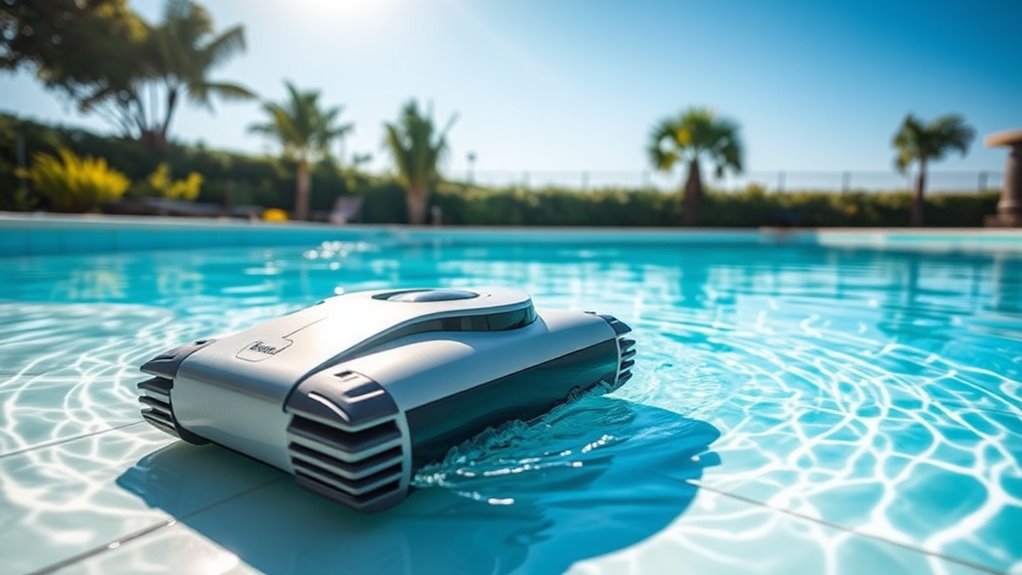
Your pool usage directly impacts how often you should run your suction pool cleaner. If you swim daily or host frequent gatherings, running your suction pool cleaner 3-4 times a week keeps debris and dirt in check. For moderate use, such as weekly swims, 1-2 cleanings per week should suffice. Regular robotic maintenance helps ensure your cleaner operates efficiently, reducing the need for frequent deep cleanings. Additionally, maintaining proper chemical balancing minimizes algae and grime buildup, making cleaning sessions more effective. If your pool sees heavy use or experiences lots of debris, increasing cleaning frequency is advisable. Conversely, low-traffic pools might only need weekly maintenance. Adjust your schedule based on usage patterns to keep your pool clean, safe, and well-maintained without overworking your equipment. Proper filtration and filter maintenance also play a crucial role in prolonging the effectiveness of your cleaning routine. Implementing a consistent cleaning schedule tailored to your pool’s usage patterns can help prevent costly repairs and extend the lifespan of your equipment. Regularly inspecting your vacuum components ensures optimal performance and reduces unexpected breakdowns. Staying informed about technological advancements in pool cleaning can further improve efficiency and ease of maintenance. Incorporating energy-efficient tools like electric bike generators can also make your pool maintenance more sustainable and cost-effective.
Seasonal Adjustments for Pool Maintenance
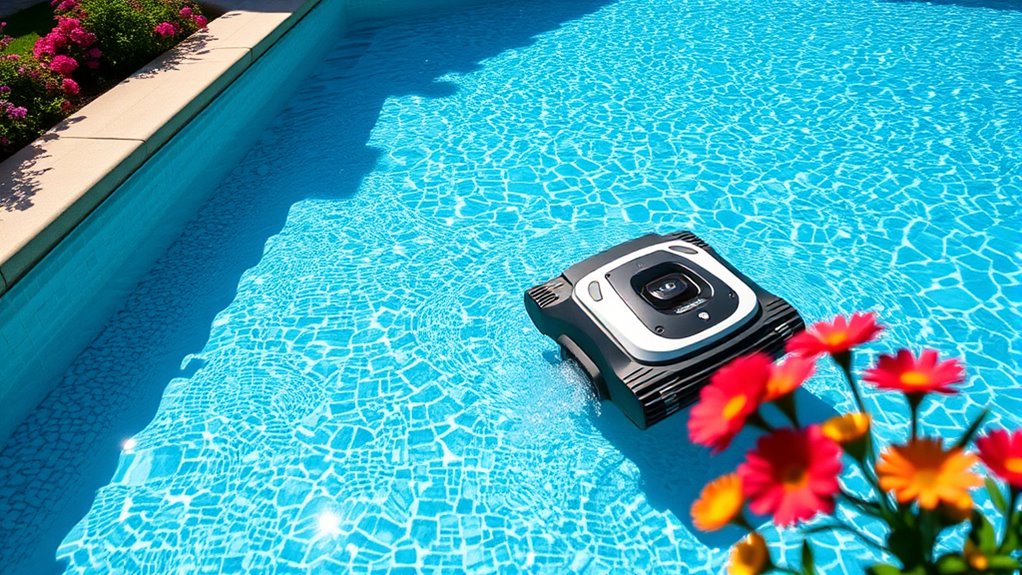
As seasons change, so do the conditions affecting your pool’s cleanliness and maintenance needs. In colder months, you may need to run your suction pool cleaner less often, but you should still monitor the pool chemical balance regularly to prevent algae growth and corrosion. During warmer months, more frequent cleaning helps manage increased debris and sunlight exposure. Adjust your pool equipment maintenance schedule accordingly—clean filters and check pumps more often when usage peaks. Keep a close eye on water chemistry, as imbalances can lead to cloudy water or algae. Proper seasonal adjustments guarantee your pool stays clear and safe, reducing strain on your equipment and maintaining ideal chemical levels year-round. Additionally, consider the dog names that reflect your style, so your furry friend matches the vibe of your well-maintained pool area. Regularly inspecting and maintaining your pool equipment, such as suction pool cleaners, during each season can extend their lifespan and ensure optimal performance. To ensure your pool remains in top condition, staying informed about precious metals and investment strategies can also be beneficial for long-term financial security.
Signs Your Pool Needs More Frequent Cleaning

If you notice debris accumulating quickly or water clarity declining unexpectedly, it’s a clear sign you need to clean your pool more often. When your pool isn’t properly maintained, debris can clog filters, disrupting pool equipment maintenance. Additionally, poor water circulation can affect the pool chemical balance, leading to algae growth or cloudy water. Regular filter system maintenance can help prevent these issues and ensure optimal performance. Keep an eye on these signs to prevent bigger issues: Volkswagen Tuning techniques can often be adapted to optimize pool filter systems for better performance. Moreover, understanding size restrictions for tiny houses can be beneficial if you’re considering expanding your pool area or installing additional features. Proper circulation and chemical balance are essential for maintaining a healthy and inviting swimming environment. Recognizing the importance of water movement can also improve overall pool health and efficiency.
Tips for Optimizing Your Pool Cleaning Routine

To keep your pool clean and inviting, optimizing your cleaning routine is key. Start by adjusting your schedule based on debris accumulation; more debris means more frequent runs. Ensure your suction pool cleaner has a clear, unobstructed pathway to maximize robotic efficiency. Regularly check and clean the filter to prevent clogs that hinder performance. Keep the skimmer basket empty to reduce debris buildup. Consider dividing your cleaning into shorter, more frequent sessions rather than long, infrequent ones—this prevents debris from settling and promotes thorough cleaning. Use a timer to maintain consistency, and monitor your cleaner’s coverage to identify areas needing extra attention. Additionally, choosing the right pool cleaning equipment can significantly enhance your routine’s effectiveness. Proper priming of your cleaner ensures smooth operation and prevents interruptions. Being aware of energy-efficient features can help lower operational costs over time. Incorporating regular maintenance routines can also extend the lifespan of your pool cleaning system. Maintaining a consistent cleaning schedule helps prevent buildup and keeps your pool sparkling. Implementing these tips helps your pool stay cleaner longer and extends your cleaner’s lifespan.
Frequently Asked Questions
Can I Run My Suction Pool Cleaner During Rainstorms?
Running your suction pool cleaner during rainstorms isn’t recommended. Rainstorm maintenance can wash debris into your pool, making it harder for your cleaner to do its job and potentially damaging your equipment. It also poses pool safety risks, like slippery surfaces and electrical hazards. To keep your pool safe and well-maintained, avoid running your cleaner during rainstorms, and wait until the weather clears for effective cleaning and safety.
How Does Water Temperature Affect Cleaning Frequency?
Water temperature impacts your pool cleaning schedule because warmer water promotes algae growth, which can clog your suction pool cleaner more quickly. If your water is consistently warm, you might need to run your cleaner more often to prevent algae buildup and maintain clarity. Cooler water slows algae growth, so you can reduce cleaning frequency. Keep an eye on water temperature to adjust your cleaning routine accordingly.
Is Daily Cleaning Necessary for Small Pools?
Imagine your small pool as a shimmering mirror, reflecting sunlight and tranquility. You probably don’t need to run your suction pool cleaner daily, unless pool debris is frequent or leaves constantly drift in. A regular cleaning schedule—once a week or biweekly—keeps your water clear and inviting. Adjust based on debris levels and usage, ensuring your pool stays pristine without overcleaning, preserving its natural sparkle and your enjoyment.
Can Running the Cleaner Too Often Damage the Pool?
Running your suction pool cleaner too often can lead to unnecessary wear and tear on the equipment, potentially causing damage over time. It might also disrupt your pool’s natural balance if you don’t adjust your pool maintenance and cleaning schedule accordingly. To avoid issues, follow the manufacturer’s recommendations and don’t overuse the cleaner. A balanced cleaning schedule ensures your pool stays clean without risking damage from excessive use.
Should the Cleaner Be Used More Frequently After Parties?
After parties, you should run your suction pool cleaner more frequently to handle party debris and prevent chemical imbalances. Debris from snacks, drinks, and decorations can quickly clog your filter and affect pool chemicals. Running the cleaner guarantees your pool stays clean and balanced, reducing algae growth and maintaining water quality. Just don’t overdo it—regular, targeted cleanings after parties keep your pool in top condition.
Conclusion
While it might seem like constant cleaning is a hassle, following these guidelines guarantees your pool stays pristine without overdoing it. Remember, your pool’s needs change with use and seasons, so stay attentive to signs it needs more attention. Regular maintenance actually saves you time and money in the long run. Don’t let fear of overcleaning hold you back—trust your pool’s signals and enjoy a crystal-clear swim whenever you want!

